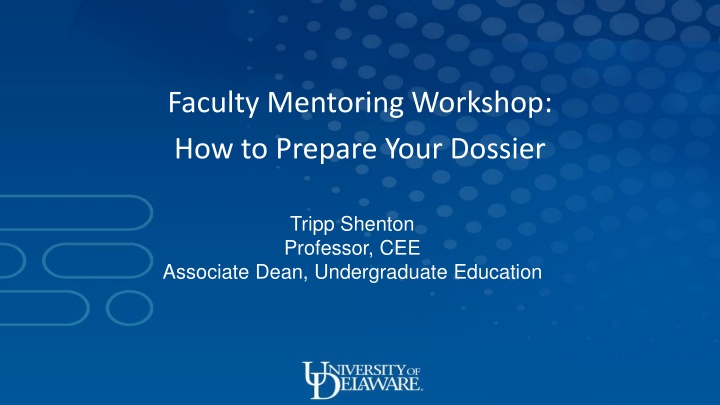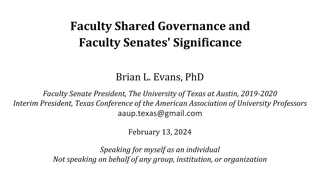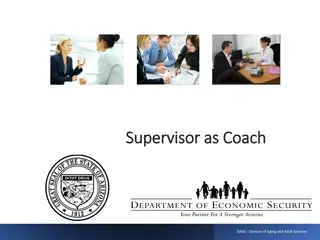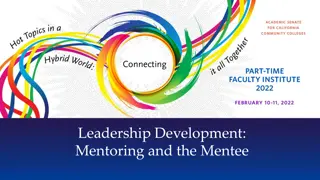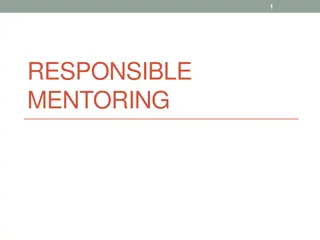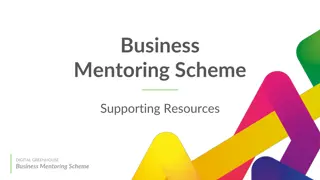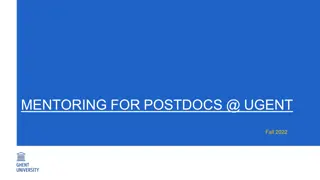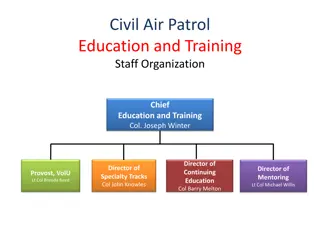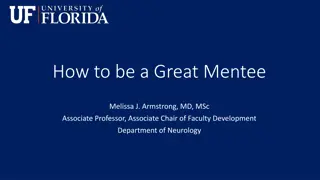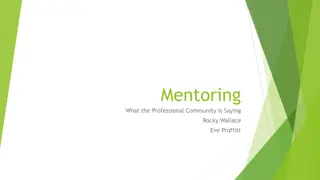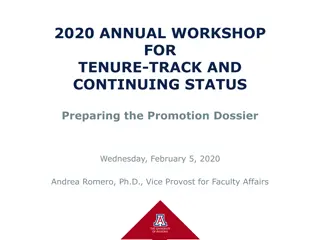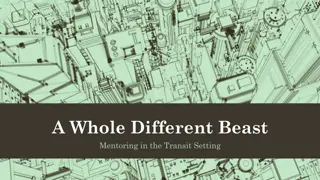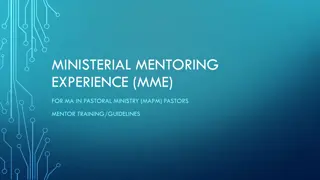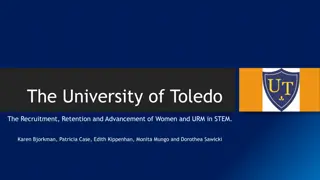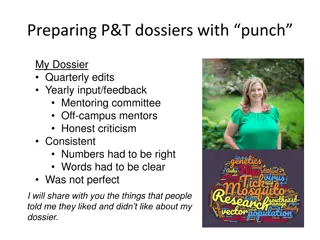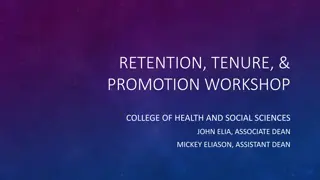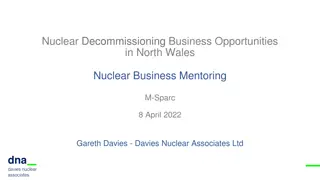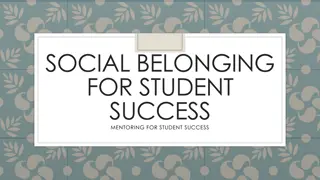Faculty Mentoring Workshop: Prepare Your Dossier with Prof. Tripp Shenton
Learn valuable insights on dossier preparation from Prof. Tripp Shenton, a distinguished faculty member at UD Civil and Env. Eng. Discover tips, observations, recommendations, and potential red flags to enhance your dossier for successful review by committees. Get expert advice on navigating the challenging COE P&T committee and optimizing your academic portfolio.
Download Presentation

Please find below an Image/Link to download the presentation.
The content on the website is provided AS IS for your information and personal use only. It may not be sold, licensed, or shared on other websites without obtaining consent from the author.If you encounter any issues during the download, it is possible that the publisher has removed the file from their server.
You are allowed to download the files provided on this website for personal or commercial use, subject to the condition that they are used lawfully. All files are the property of their respective owners.
The content on the website is provided AS IS for your information and personal use only. It may not be sold, licensed, or shared on other websites without obtaining consent from the author.
E N D
Presentation Transcript
Faculty Mentoring Workshop: How to Prepare Your Dossier Tripp Shenton Professor, CEE Associate Dean, Undergraduate Education
Prof. Tripp Shenton - Background Joined UD Civil and Env. faculty in 1994 Promoted to Assoc. Prof. 2000 Promoted to Full Prof. 2008 Chair of the Dept. of Civil & Env. Eng. 2007-2017 Member of COE P&T Committee 2019 Associate Dean for Undergraduate Education 2020-
Experience with P&T ~4 cases as a member of CEE P&T committee (10+ years) 11 cases as chair of CEE (10 years) 11 cases as member of COE P&T committee (1 year)
Dossier Tips General structure is defined .specific format/layout is up to you Keep it clean, organized, consider carefully the layout. Find other samples to looks at steal the one you like best Keep in mind the committees that have to review more than a few dossiers Anticipate questions Have a colleague review it 4
Observations The COE P&T Committee is your toughest hurdle Members of COE P&T are all engineers/CISC scientists .makes them close to your field but not necessarily close enough Members of COE P&T serve 2-3 years .frequent turnover Strong support from the dept. and chair does not guarantee strong support from the COE COE P&T can be viewed as the check on dept. recommendations There s no hiding short comings
Recommendations Talk to your COE P&T rep on Dec 1 ..get the scoop Talk to the chair of your dept. P&T committee Have more than one person review your dossier, preferably someone senior from another dept. in COE Don t assume that reviewers will know the significance of everything that is in your dossier; if it s unique to your field or discipline say so and explain why The longest dossier is not the best dossier
Potential Red Flags Continued publishing with your PhD advisor .long after graduating Always buried in the middle of the author list .rarely first, rarely last No pubs with your students Have not graduated a PhD student (promotion to Assist.) Have not taught an UG class
Faculty Mentoring Workshop: How to Prepare Your Dossier Mark Mirotznik Professor, ECE University P&T Committee 2015-2019 (chair 2019)
University Level P&T Committee Process Seven members of the committee representing the various colleges Generally meets from late December to early February to review candidates for tenure and promotion # of reviews vary from 60-100 applications per year Candidates that were unanimously (or nearly) positive at all other levels are reviewed by only one person on the committee and presented to the group Candidates that have mixed or negative reviews at previous levels are reviewed by everyone with typically two people from the committee doing a deep dive. The committee provides recommendations to the Provost in Feb. If the Provost disagrees with the committee s decision she must come meet with the committee to discuss the disagreement. 9
University Level P&T Committee Process 10
University Level P&T Committee Tips for Dossiers at the University Level (1) Put the time in to create a well organized dossier that is easy for the various reviewers. Examples: Provide important data up-front such as work load, departmental guidelines, In your various statements (e.g. research, teaching, ) provide an executive summary that highlights your accomplishments. Any details to support your case can be added as appendices (e.g. student letters and emails, philosophies on teaching and research, ) 11
University Level P&T Committee Tips for Dossiers at the University Level (2) This is not a time to be modest. Provide all of your accomplishments within the dossier (even if provided within an appendix). Also if you have had some accomplishments since you originally submitted the dossier (e.g. paper accepted, new grant, student graduated, awards .) you can, and should, add them to the dossier later. 12
University Level P&T Committee Tips for Dossiers at the University Level (3) If there is a weak spot in your record (e.g. teaching evals, funding .) don t ignore it hoping nobody will notice. Provide arguments in your various statements that address the weakness. For example; If you had some poor teaching evaluations early on but have worked to improve them through various workshops, mentoring, ., make that clear. 13
University Level P&T Committee Tips for Dossiers at the University Level (4) If your case has mixed or negative reviews at any level it is important to write a strong rebuttal/appeal letter that is included in your promotion package. My advice in writing those letters is: The letters should provide fact based arguments on how you believe your case satisfies the criteria outlined in the departmental guidelines. In general it is not helpful to; (1) bring up previous cases that you feel were not as strong as yours, (2) bring up personal issues with other faculty or chairs (unless you have strong evidence to back up those claims) 14
How to Prepare Your Dossier: Some CT Considerations 2021 Faculty Mentoring Workshop Joshua Enszer Associate Professor, Chemical & Biomolecular Engineering
Potential Challenges for CT Faculty Rules for promotion of non-tenured faculty vary a lot from institution to institution so some outside reviews can be tricky CT workload assignments can often take on a wider variety of configurations relative to TT faculty There s less history/implicit understanding of success for CT promotion compared to TT promotion
Rules for promotion of non-tenured faculty vary a lot from institution to institution Try to recommend reviewers familiar with your situation Because some CT workloads prevent developing a national reputation, university policy is that outside reviews for CT faculty are outside the department, so try to have other CT faculty at UD on your list if possible Make it easy for all reviewers by copy/pasting key parts of your department bylaws/P&T docs directly into your dossier to communicate standards
CT workload assignments can take on a variety of configurations Seize the opportunity to clearly explain your workload percent breakdown, how it changed year-to-year (if applicable), and what that workload typically means for your program Reflect early and often on what work belongs in what buckets (teaching, service, research/scholarship) or combination of buckets If it s feasible, figure out how to publish about your teaching and/or service
Theres less history/implicit understanding of success for CTs so define excellence and show it! Some options for teaching: Narrative on teaching philosophy, context, learning goals Collection of syllabi, assessments, and other documents Data on achievement of learning outcomes ( direct assessment ) Documentation of improvements in teaching and learning Emphasize your contributions to department needs (Do you teach primarily the largest required courses? Do you bring a specific expertise?) Document your attendance at teaching events (CTAL, ASEE, others) and what you gained Document teaching leadership mentoring of students/faculty Help readers interpret student perceptions of your courses
Theres less history/implicit understanding of success for CTs so define excellence and show it! Reflect on multiple dimensions for service: University/College/Department committee work, coordination of a course/program, advising student groups, contribute to major functions Profession professional meetings and organizations, review of dossiers, service for journals, book editing, online teaching Community outreach events, recruitment efforts, citizen science Full list of recommendations from the CT Caucus: https://sites.udel.edu/ctcaucus/2018/04/15/recommendations-for-department-pt-documents/ whether or not your department documents follow this advice, consider it for yourself as you make your dossier!
